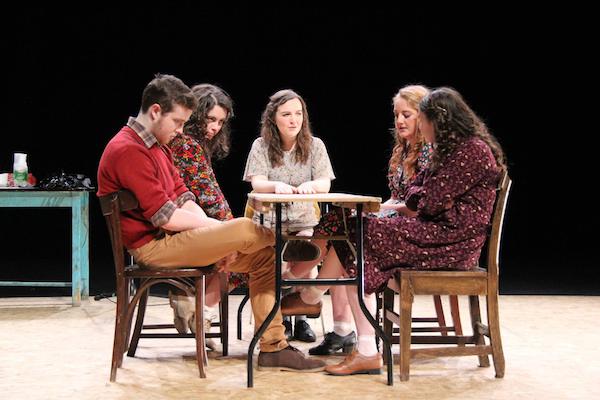
It seems silly, in a festival as diverse as Dublin Fringe Festival, to begin a retrospective of its offerings with the rather narrow list of awards meted out, but with over 80 productions it is as good a place to start as any. The range of issues covered in this year’s fringe festival were, as usual, expansive, but many productions clustered thematically around truth, which is unsurprising given the present political climate and the fact that it was singled out as a key theme for prospective fringe applicants this year.
The winner of Best Production was Grace Dyas and Emma Fraser’s Not At Home. It is extremely difficult not to see this production, which explored the experience of Irish women travelling to England to procure abortions in an affecting, but by no means ground-breaking or spectacular fashion, as riding a wave of political goodwill from the theatre community to claim this prize. It is also notable that, in a festival dominated by critical examinations of what constitutes “truth”, that Not At Home, a show which implicitly asserts its uncomplicated authenticity, should claim the top prize. This demonstrates an unfortunate blind spot in the usually critical eye of the Irish theatre industry.
Soldier Still, about the trauma of war, from the Junk Ensemble, a perennial fringe favourite, received several nominations including Best Ensemble and Best Production, while winning Best Design. Fionn Foley’s Fierce Notions, an enjoyable if slightly rough, satirical romp also garnered several nominations, including Best Ensemble, Best New Writing, the Spirit of Wit Award and finally sharing the Judges’ Choice Award with Trophy.
Other shows which did not appear quite so frequently, or even at all, on the judges’ ballots, but possibly should have, included Efficacy 84, a slickly directed examination of the Kerry Babies scandal which was, perhaps, a little too slick in its ultimate response to its subject matter. Papini, a fascinating play with unnerving direction which may have been slightly too long and esoteric for the judges’ tastes, as well as Talk Real Fine, Just Like a Lady, which rightfully claimed a Best Design nomination for its transformation of the Peacock theatre. The production was very loosely based on Teresa Deevy’s The King of Spain’s Daughter and performed by deaf actors, but its abrupt ending marred a trance-like forty minutes with a plug for Irish Sign Language, cheapening the evening.
Then there were the productions that are difficult to place. The realism in Nadine Flynn’s very able Polar Night simply seemed antique, and slightly irrelevant, in comparison to everything else on offer at the fringe. Owen Wingrave, Irish Youth Opera’s staging of Britten’s chamber piece, suffered from an absence of design and direction and a host of campy performances (except from the central figure), but proved surprisingly relevant in its depiction of British nationalism during World War I. And then there was the Shitstorm. Yes, that’s what it was actually called. I’ll say no more.
For me, the winner of the fringe was Everything Not Saved, Malaprop’s intellectually sophisticated meditation on memory. Although its three scenes do not hang together dramaturgically, one suspects that the writer, the relentlessly clever Dylan Coburn Gray, had conceived of several different ways to explore his theme but could not decide on one. Its intelligent design by Molly O’Cathain, and snappy performances, marshalled with a thoroughly modern sensibility from director Claire O’Reilly, made this the show that lingered in my mind long after the lights came up.
Correction: 22:49, September 28th, 2017
An earlier version of this article incorrectly said that Soldier Still is by Brokentalkers. In fact, it’s a play by the Junk Ensemble.






